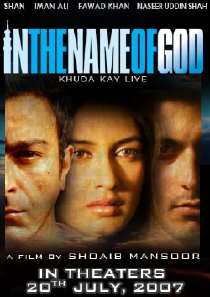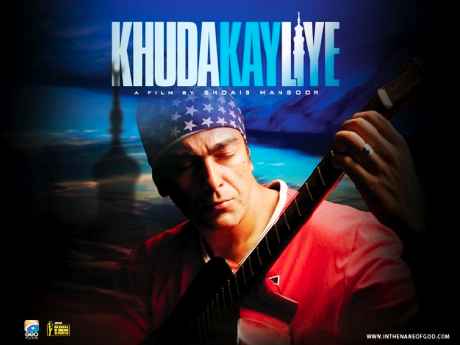(UPDATE: You can view this movie here).
We had a preview of the movie Khuda Ke Liye at ATP where we had posed a question whether Shoaib Mansoor will be able to revive Pakistan cinema? A probable answer comes from myself who recently got chance to see this movie. The record breaking Pakistani film Khuda Ke Liye has become my favorite film overnight- Hollywood inclusive. Or more accurately I should say, that there hasn’t been a film in the past that has moved and affected me in this way.
Given the standing ovation the film is getting in theatres all over Pakistan from rich and poor alike, one can safely say that I am not the only one. For one thing it is a uniquely Pakistani story, which could have only come out of Pakistan. To sum it up, it is about us – the people of Pakistan warts and all- take it or leave it.
The genius of Shoaib Mansoor was never in doubt for those who have seen his videos or for that matter the famous Alpha Bravo Charlie – the TV Drama on Pakistan Army. What I was unprepared for was the depth in his thought and the way he has managed to capture the Pakistani dilemma on screen. Ours is a complex and rich predicament which needs to be captured in all its nuances and appreciated in all its paradoxical colors. KKL did just that.
 I went to the theatre expecting to see the same old liberal v. fundo arguments. There were those, but unlike how these arguments play out in “The Friday Times” and the “Nawai Waqt“, this remarkable film is fully conscious of its Pakistani identity and the strong Islamic component that forms part thereof.
I went to the theatre expecting to see the same old liberal v. fundo arguments. There were those, but unlike how these arguments play out in “The Friday Times” and the “Nawai Waqt“, this remarkable film is fully conscious of its Pakistani identity and the strong Islamic component that forms part thereof.
At the risk of spoiling it for those who haven’t seen it, this is the story of two brothers, Mansoor (played by Shaan) and Sarmad (played by theatre actor/musician Fawad of EP fame) both musicians, brought in a well to do Pakistani family. Mansoor and Sarmad are torn apart by the latter’s increased involvement with a certain Maulana Taheri (based most probably on Maulana Sami ul Haq of JUI-S component of the MMA), who turns the soft spoken Sarmad into full fledge Jehadi.
Things are complicated when the brothers’ cousin Mary arrives from London to spend a few days with them, only to discover that she has been tricked by her father into coming to Pakistan to avoid her marrying her Non-Muslim boyfriend Dave. Meanwhile Mansoor leaves for Chicago to enrol at the “School of Music” there. In an epic that switches from London to Lahore to Waziristan to Nangahar Afghanistan to Chicago, these ordinary Pakistanis are increasingly faced with both internal and external conflict. And then there is September 11.
Shoaib Mansoor does not miss a beat, he does not leave any stones unturned. While all characters have more or less the same significance in this plot, it is Mansoor who is at the centre of it: Mansoor who is a proud Pakistani and secure in his Muslim identity, Mansoor who warns Sarmad against extremism, Mansoor who puts the best Muslim and Pakistani foot forward, Mansoor who is abducted by FBI in the middle of the night and beaten and tortured to a pulp, humiliated and abused for being a Pakistani and a Muslim. He is the contrast to Sher Shah and Maulana Taheri. But there are contrasts on the other side as well… Jenny who loves Mansoor for being Mansoor, his classmates who spontaneously join in when Mansoor performs his “music from Pakistan”, his African American professor… all stand in contrast to the American torturers of Mansoor.
The dialogue reaches a fever pitch in a court room in Lahore, where Mary is engaged in a prolonged legal battle. Enter the Bollywood star Naseeruddin Shah. He plays the character of a long bearded progressive Islamic scholar (probably based on Maulana Ahmed Javed and Allama Javed Ahmed Ghamidi of Lahore). In what would be the localised version of “Inherit the wind” Courtroom drama, he engages Maulana Taheri and his coterie in an argument on Islamic law and Islamic dress code.
“There is beard in religion, but no religion in beard,”
declares Shah, adding that
“Two men who did the greatest service to Islam in Pakistan, Mahomed Ali Jinnah and Allama Iqbal, did so without a beard and out of the so called Islamic dresscode, in western dress.”
It was on this line that the entire hall filled with applause. Islam – the universal faith – has no uniform. This lays the stage for the final scene- the most poignant scene of the movie, filmed in Lahore’s beautiful Wazir Khan Mosque– the scene which once again made a Muslim out of me. I’ll let you watch it yourself to understand what I am talking about.
As for the film itself, there seem to be a few technical glitches earlier on but they are easily forgotten. Iman Ali‘s performance as Mary or Maryam in the beginning is annoying and one finds her concocted British accent a little annoying at first. However it grows on you and one discovers the fullness of her effort- which is by far the best I have come across by a Pakistani actress. As for the music, those of you who have only heard Bandaya, you are in for a surprise. The film is as a whole an incredible musical experience. What is more is that you discover how aptly Shoaib Mansoor has placed his music in the various scenes. Indeed, driving back from Lahore on the motorway, I could recount/recollect every scene just by listening to the soundtrack.
This is a movie no Pakistani can afford to miss.





















































salamalikum.. sab se pahle mein yeh keho ga ke shoaib mansoor or shan ager mujhee nazar ayee to slute dono ko kay film banaye hai app neh kasam se dil se arab baar good movies…… mein mantaa hoon ke all world mein koi bhi aise admi nehi hai (shoaib mansoor) jesa ke writer bhi producer bhi and sab se bardi baat diractor bhi ho ker itni achi movie hai sir againnnn sluteeeeeeeeeeeeeeeeeeeeeeee……….ok ji allah afiz and nice singer ahmad jehanzib and sayen zahoor….
Finally saw the movie.
After all the hype I was not so impressed.
I found the character development shallow. The acting quality was not so hot. I hated the American actress. Hated her. She enunciated like she was in a high school drama class. Was this because Mansoor was afraid that his audience wouldn’t understand idiomatic American English?
Iman Ali is lovely to look at, but it takes more than that.
I think esp. in the portrayal of the cross cultural relationship the screenwriter could have dug much deeper. The stumbling blocks don’t really revolve around the woman agreeing not to wear shorts or eat bacon. They revolve around the complete inability of Americans to understand the Pakistani concepts of, among other things, family obligations just to give an example (“why can’t we put your mother in a nursing home, dear? What?! You expect ME to look after her?”)
I don’t know, I felt the movie was skimming along the surface where some topics were concerned.
But a great start and hopefully more projects of this type will follow in the future. I hope American audiences will warm to it if only to learn from another’s point of view.
Hi ppl. I’m Himanshu from India. This movie was released in India on 4th apr, 2008. I have no idea about the overall response of crowd, but this was not just another topic based movie. For Indians, it was an extremely informative movie narrated very well.
For me personally, I have never seen such spectacular movie. Now i know something more about Islam and thats really positive.
Especially in second half, hall was pin drop silent and everybody was totally engrossed in what was goin on screen. This clearly shows how good the movie was.
I like the movie overall but i am really upset about why Shoaib has used the name of Hazrat Imam Hussain (A.S.) while picturing the die hard and terrorist kind of religious people in the movie. We all know there are good and bad people, extremiests and modest people in every religion but by showing Hazrat Imam Hussain (A.S.)’s name in Afghanistan Shoaib has tried to propogate the concept that most of the terrifying religious extremiests come from a Shia background even the terrorist Afghanis are also Shia. I am sorry to say but my knowledge says most of the Afghanis are so poor they are not getting good education, neither Islamic nor Academic so actually they are not following any specific religious group or any of the Rasul-e-Paak (S.A.W.W.)’s Sahaba or Grandsons properly.
Any illiterate person who does not have religious or proper academic education is going to destroy his ownself and other peoples’ lives too while following his own stupid conceptions whether he pretends to follow Hazrat Imam Hussain or Hazrat Abu Bakar, it never means a learned man like Shoaib should have had shown some specific name in the desserts of Afghanistan to prove most of the Jaahil Afghanis are following Shiaism, and that is absolutely incorrect.
Amazing movie. But I Have to disagree with Kamran somorro about the music as he is saying that they were few things that were Halal but later they were declared Haram. But what about the Hazrat Ayesha argument where Hazrat Muhammad (
P.B.U.H) asket Hazrat Ayesha to send some singers with the barat. and onestly i havent read anything in the Quran about music being Haram.